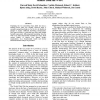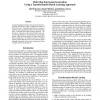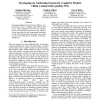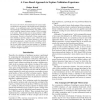FLAIRS
2006
14 years 4 months ago
2006
The main contribution of this paper is to suggest a novel technique for automatic creation of accurate ensembles. The technique proposed, named GEMS, first trains a large number o...
FLAIRS
2006
14 years 4 months ago
2006
The need to provide computers with the ability to estimate the affective state of their users is a major requirement for the practical implementation of Affective Computing concep...
FLAIRS
2006
14 years 4 months ago
2006
FLAIRS
2006
14 years 4 months ago
2006
Advances in sensing and communication technology make sensor networks a convenient and cost effective tool for collecting data in hard to reach and hazardous areas Increasingly, s...
FLAIRS
2006
14 years 4 months ago
2006
Populating the Cyc Knowledge Base (KB) has been a manual process until very recently. However, there is currently enough knowledge in Cyc for it to be feasible to attempt to acqui...
FLAIRS
2006
14 years 4 months ago
2006
A natural language generation system must generate expressions that allow a reader to identify the entities to which they refer. This paper describes the creation of referring-exp...
FLAIRS
2006
14 years 4 months ago
2006
In this paper, we introduce a new restricted Bayesian network classifier that extends naive Bayes by relaxing the conditional independence assumptions, and show that it is partly ...
FLAIRS
2006
14 years 4 months ago
2006
Producing Intelligent Tutoring Systems (ITSs) is a labor-intensive process, requiring many different skill sets. A major component of an ITS, the cognitive model, has historically...
FLAIRS
2006
14 years 4 months ago
2006
Recent work in lexical resource construction has recognized the importance of contextualizing the knowledge in existing resources and ontologies with information derived from text...
FLAIRS
2006
14 years 4 months ago
2006
The success of TURING Test technologies for system validation depends on the quality of the human expertise behind the system. As an additional source of human experts' valid...




